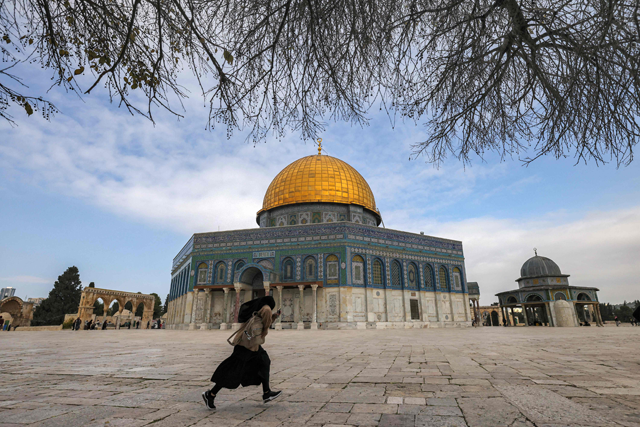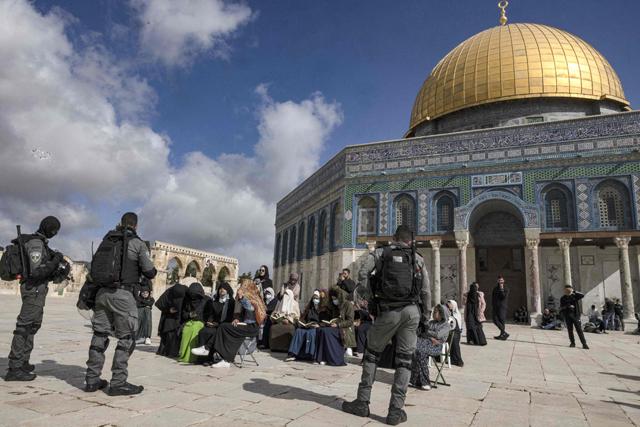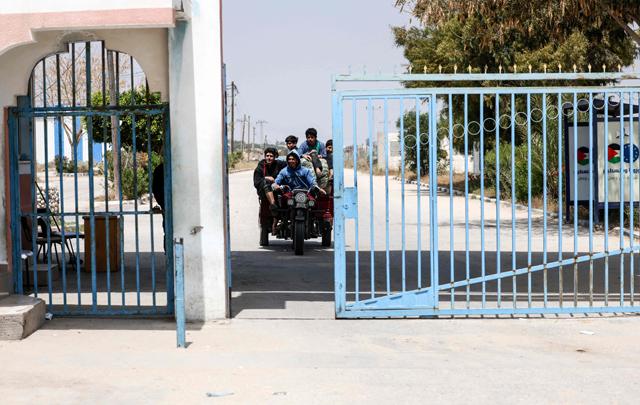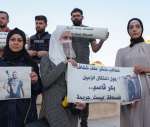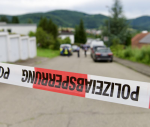You are here
Gaza rockets, Israel strikes stoke new Jerusalem confrontations
By AFP - Apr 21,2022 - Last updated at Apr 21,2022

Flames and smoke rise during Israeli air strikes on central Gaza strip on Thursday (AFP photo)
OCCUPIED JERUSALEM — Palestinian fighters in the Gaza Strip and Israeli warplanes exchanged fire on Thursday in the biggest escalation in months, followed by fresh violence at Jerusalem's flashpoint Al Aqsa Mosque.
Israel carried out air strikes in central Gaza after midnight, hours after a rocket fired by fighters hit the garden of a house in southern Israel — the first such fire to hit Israel since January.
The military said it had hit an underground rocket factory, prompting another volley of rockets from the impoverished territory, run by Islamist movement Hamas.
The exchanges come after nearly a month of deadly violence focused on Israeli-occupied East Jerusalem's flashpoint Al Aqsa Mosque compound, known to Jews as the Temple Mount.
Palestinians have been outraged by repeated visits by Israeli Jews to the site, the third-holiest in Islam and the holiest in Judaism.
By long-standing convention, Jews are allowed to visit but not pray there.
On Thursday morning, Israeli forces fired tear gas and multiple stun grenades inside the compound, AFP journalists reported.
The Palestinian Red Crescent said that over the past week Israeli forces had "forcefully removed worshippers" from the mosque, "using rubber-coated metal bullets, batons, tear gas canisters and pepper spray in enclosed spaces".
It said it had treated 202 people wounded in the violence since last Friday.
Israeli forces, however, accused dozens of "rioters" of throwing stones and petrol bombs from the mosque and "stopping Muslim worshippers from entering the mosque".
Seven Palestinians from East Jerusalem were arrested in connection with "violent incidents" on Wednesday, the police said.
US delegation
Nearly a month of deadly violence have sparked international fears of a major escalation, a year after similar unrest led to an 11-day war.
US acting Assistant Secretary of State Yael Lempert and senior diplomat Hady Amr visited the region on Thursday.
After meeting them, Israeli Foreign Minister Yair Lapid called for calm, saying Israel "will not accept, in any situation, rocket fire from the Gaza Strip".
Lapid said Israel is "preserving and will continue to preserve the status quo on the Haram Al Sharif" — contradicting Palestinian claims.
But Arab ministers meeting on Thursday in neighbouring Jordan said Israel should respect the status quo at the site, which is officially overseen by the kingdom’s Islamic Affairs Ministry.
The ministers condemned “Israeli attacks and violations against worshippers at Al Aqsa Mosque”, calling them “a blatant provocation to the feelings of Muslims everywhere”.
Tensions have been particularly high as the Jewish Passover festival coincides with the Muslim holy fasting month of Ramadan.
Palestinians and Arab Israelis carried out four deadly attacks in Israel in March and early April that claimed 14 lives, mostly civilians.
A total of 23 Palestinians have been killed since March 22, including assailants who targeted Israelis, according to an AFP tally.
‘Death to the Arabs’
On Wednesday, Israeli forces had prevented hundreds of far-right Jewish nationalists from parading through the Muslim quarter of Jerusalem’s Old City.
Last year, a similar march had been set to start when Hamas launched a barrage of rockets towards Israel, sparking the 11-day war.
Far-right opposition lawmaker Itamar Ben Gvir led this year’s protest after being barred from the Damascus Gate area by Prime Minister Naftali Bennett.
On Wednesday, more than a thousand of Ben Gvir’s supporters gathered outside the Old City, some shouting “death to the Arabs!”
The demonstration stoked fears of a wider escalation a day after Israel had carried out its first strike on Gaza in months, in response to the first rocket fired from the Palestinian enclave since January.
It was intercepted by Israeli air defences.
But in the enclave of 2.3 million Palestinians, Umm Reem Daoud told AFP that residents were living in “a lot of fear”.
“We are afraid that things will escalate. Not even a year has passed since the last war,” she said.
“We hope in these blessed days that nothing will happen and that no one will be hurt.”
But Hamas spokesman Fawzi Barhoum said earlier Thursday that the movement was “determined to continue the struggle side by side with the Palestinian people to resist [Israeli] aggression no matter the sacrifices”.
The escalation has proved a political headache for Bennett, himself a right-winger and a key figure in Israel’s settlement movement but who leads an ideologically divided coalition government.
Earlier this month the coalition lost its one-seat majority in parliament — then on Sunday, the Raam Party, drawn from the country’s Arab minority, suspended its support for the coalition over Al Aqsa violence.
Related Articles
OCCUPIED JERUSALEM — The United Nations and the United States led a chorus of international criticism after Israel's extreme-right new natio
WASHINGTON — US Secretary of State Antony Blinken urged Israeli and Palestinian leaders Tuesday to "end the cycle of violence" after a sharp
OCCUPIED JERUSALEM — Israel said it will close its only crossing from the Gaza Strip for workers on Sunday in response to reported overnight


